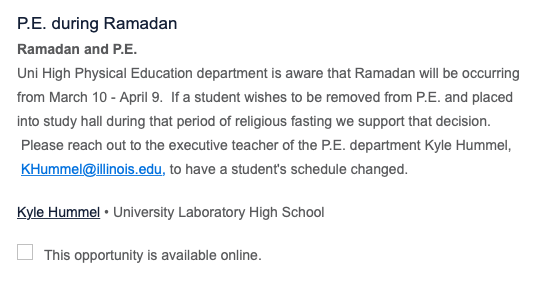Uni goers share their thoughts on Ramadan
Ramadan began yesterday, Wednesday, and Muslims across the globe, including students at Uni, are fasting and will be fasting for an entire month. Ramadan is a month of the Muslim lunar calendar, and the first day of fasting was last Wednesday. Ramadan will end sometime in mid-June.
Every day for the entirety of Ramadan, Muslims fast from dawn till sunset. This year, Muslim Uni students will fast during the last week and a half of school, which also means they will be fasting during finals week.
Ahmad Bobat has recorded interviews with Muslim Uni students, other students and the administration specifically on Ramadan, their experiences with Ramadan, and Ramadan’s impact on finals.
The recorded interviews can be accessed here.
What is Ramadan?
Ramadan is the sixth of the twelve months of the Islamic lunar calendar.
In this month, Muslims fast every day from dawn till sunset. Muslims begin their fast at the time of Fajr (the dawn prayer), and end it at the time of Maghrib (the sunset prayer).
Ramadan is a month of worship, and Muslims devote their time to worshipping Allah (God), through fasting, praying extra prayers, and doing good deeds, such as helping others, donating to charity or even smiling.
What is fasting?
Fasting during the month of Ramadan is one of the five pillars of Islam (which are testifying your faith, giving charity, completing the Hajj pilgrimage, praying the five daily prayers, and fasting during the month of Ramadan). Fasting during Ramadan is an obligation upon every Muslim mandated by Allah as long as the person is physically and mentally able to fast.
For Muslims, fasting during Ramadan is an obligatory worship, like the five prayers.
Many people think fasting is simply not eating food, but keeping a fast is much more than that. Fasting is abstaining from eating, drinking, sexual relations, and doing actions and things that are Islamically forbidden (stealing or cheating, for example).
Why do Muslims fast during Ramadan?
Fasting during Ramadan is, as stated above, a mandatory worship made obligatory by Allah. Thus, a Muslim’s first and foremost intention when fasting is to please and to worship Allah.
Who fasts?
All Muslims keep fasts in Ramadan, with the exception of those too young, those too weak physically and mentally, and those who are very sick. Fasting is not an obligation if it can have a harmful effect on your physical or mental health.
The Last Ten Days
The last ten days of Ramadan are very blessed, as the Night of Power, referred to as Laylat Al-Qadr is in these last ten days.
On the Night of Power, the first ayat (verses) of the Qur’an were revealed to Prophet Muhammad, peace and blessing be upon him, which is why this night is so blessed and important. People do not know exactly when the Night of Power is, but they know that it is in the last ten days of Ramadan.
Eid Al-Fitr
Eid Al-Fitr is the day marks the end of Ramadan and the first day of the Shawwal, the month after Ramadan. On this day, Muslims do not fast and instead celebrate the conclusion of the sacred month.
I am currently a sophomore at Uni. In my free time, I enjoy playing basketball and hanging out with friends.
Nusayb Mansury

